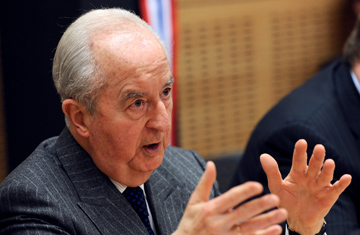
Former French Prime Minister Edouard Balladur answers questions at a May 5 parliamentary hearing before magistrates investigating the 2002 Karachi bomb attack that killed 11 French engineers
(2 of 2)
To support its thesis, The Contract quotes former Defense Minister Charles Millon, who says Chirac ordered him to scour military contracts and block payments going to people viewed as allied with Balladur. Millon says he also used secret services to trace retro-commission money to bank accounts in five European countries — but he won't identify those who benefited from them, saying, "I don't feel like taking a bullet" for doing so.
Former Chirac chief of staff and Prime Minister Dominique de Villepin is more pointed in the book in maintaining that money from the Agosta sale found its way back to Balladur. But like Millon, he refuses to make full accusations or substantiate his partial allegations. De Villepin is quoted as saying, "Chirac didn't give Millon [those] instructions without any evidence." De Villepin also says in the book that "perhaps there wasn't any material proof, but there was lots of evidence" of retro-commissions to the Balladur camp, including "phone tapping, lots of phone tapping" that revealed "ministers themselves [speaking] about Balladur and his financing. There was no ambiguity."
But also no smoking gun or any other damning proof — legal or journalistic. And that's a vital fact for many Balladur allies, foremost among them Sarkozy. Having worked with Balladur between 1994 and 1995, the book notes, Sarkozy would have had full knowledge of the details in the Agosta sale and the provenance of the funds financing Balladur's presidential bid. That's significant because Marc Trévidic, the investigating magistrate who is heading the inquiry into the Karachi bombing, reasons that anyone who had knowledge of the entire setup would presumably have had suspicions that the attack that killed the 11 French nationals — all naval engineers working on the submarines — was a retaliatory act for the halting of kickbacks. If so, logic holds that they would have passed their suspicions on to investigators who were focused on following the jihadist trail.
But the revenge theory only arose last year, when Trévidic came across documents detailing the Agosta sale and spoke with officials who confirmed payments to facilitators. Some of those officials told him they'd suspected the attack was retaliation from the start. And that has played a big part in stoking speculation that officials of the time failed to air similar suspicions out of fear that the investigation would dig up evidence of their receiving retro-commissions.
Cabinet members of that era who have commented on the allegations — including Balladur — have denied them out of hand. After an article in the daily Libération last week suggested that Balladur's campaign had benefited from suspicious funds that could have been Agosta retro-commissions, he flatly denied the allegations. For good measure, Balladur also gave testimony at his own request to a special parliamentary panel looking into the case, in which he again denied all wrongdoing. The Elysée, meanwhile, has given no response to The Contract and its accounts.
That leaves the affair in a standoff of suspicion, accusation and refutation. Without hard evidence, the retro-commission scheme remains a speculative link to the unproven theory that the Karachi bombing grew out of denied kickbacks. It's a titillating story, but, so far, it's only conjecture. If anyone manages to complete the financial circle back to the former government, however, it would prove explosive for France's entire political establishment.
